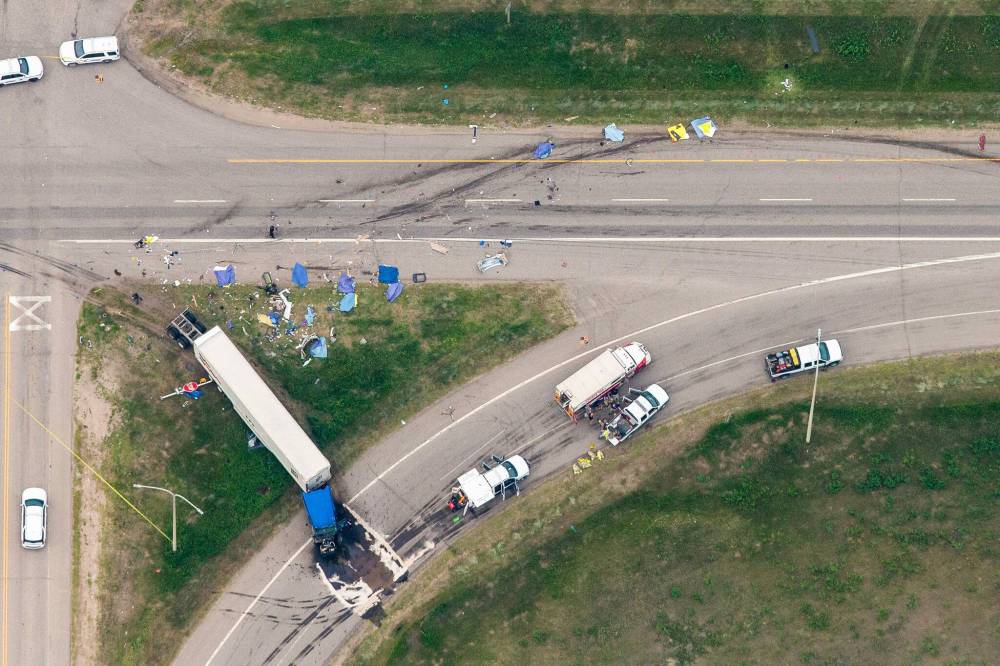Bus driver’s lifetime of suffering more punitive than charges
Advertisement
Read this article for free:
or
Already have an account? Log in here »
To continue reading, please subscribe:
Monthly Digital Subscription
$0 for the first 4 weeks*
- Enjoy unlimited reading on winnipegfreepress.com
- Read the E-Edition, our digital replica newspaper
- Access News Break, our award-winning app
- Play interactive puzzles
*No charge for 4 weeks then price increases to the regular rate of $19.95 plus GST every four weeks. Offer available to new and qualified returning subscribers only. Cancel any time.
Monthly Digital Subscription
$4.99/week*
- Enjoy unlimited reading on winnipegfreepress.com
- Read the E-Edition, our digital replica newspaper
- Access News Break, our award-winning app
- Play interactive puzzles
*Billed as $19.95 plus GST every four weeks. Cancel any time.
To continue reading, please subscribe:
Add Free Press access to your Brandon Sun subscription for only an additional
$1 for the first 4 weeks*
*Your next subscription payment will increase by $1.00 and you will be charged $16.99 plus GST for four weeks. After four weeks, your payment will increase to $23.99 plus GST every four weeks.
Read unlimited articles for free today:
or
Already have an account? Log in here »
Hey there, time traveller!
This article was published 26/06/2024 (563 days ago), so information in it may no longer be current.
There is often precious little satisfaction to be found at the intersection of tragedy and justice.
Case in point: on Wednesday, RCMP and Manitoba Justice offered an exhaustive analysis of their year-long investigation into the horrible June 15, 2023 crash on the Trans-Canada Highway near Carberry that claimed 17 lives and made headlines around the world.
The conclusion is that — when all factors are considered — no charges are to be be laid under either the Criminal Code of Canada or the Manitoba Highway Traffic Act.
RUTH BONNEVILLE / FREE PRESS FILES RCMP say they may never know what, exactly, happened the day the minibus was hit by a semi-truck.
The investigation determined that while there were a number of contributing factors, including a blind spot created by the design of the bus that obscured the driver’s view of oncoming traffic from the right side, the inability of investigators to interview the driver made it impossible to say why he failed to see the semi-truck that slammed into the bus.
“As investigators, we hope to provide the ‘why’ of what happened, and that is why we do what we do,” said Supt. Rob Lasson, head of the RCMP’s major crimes division. “In this case, we cannot say why the bus proceeded into the intersection that day when it was unsafe to do so.”
The police and prosecutors acknowledged their decision would be resented by some members of the public or the families of the victims. However, in an act of ultimate compassion, prosecutors and police travelled to Dauphin to meet with the victims’ families the day before the decision was made public.
That gesture likely could not mitigate all the concerns of some families, but it demonstrates enormous maturity on the part of justice officials and a tremendous respect for the impact this decision has on others.
It’s hard to quibble with the decision not to charge.
The driver stopped at the intersection. He was not impaired by drugs or alcohol. Despite a witness claiming the driver had been using his phone, there was no evidence he was using his device at the moment he pulled into the eastbound lane of the Trans-Canada Highway and into the path of the semi-truck.
There was also no evidence the semi-truck was driving unsafely, speeding, or had a fair opportunity to avoid the crash.
Police have been unable to interview the driver because of a traumatic brain injury. Even if he was able to be interviewed, prosecutors said it would be unlikely he could say anything that would change their decision not to lay charges.
In many ways, this crash and subsequent decision not to lay charges amplifies the vagaries of the criminal justice system when it comes to the mistakes we make behind the wheel of a motor vehicle.
In broad terms, the Criminal Code focuses on instances where there is clear evidence of “dangerous driving,” a term that describes scenarios where the operator of a motor vehicle deviates from the “standard of care of a reasonable driver.”
If there are injuries or death resulting from dangerous driving or driving under the influence of drugs or alcohol, criminal charges and lengthy prison sentences can be the result. In cases where a driver’s behaviour was particularly risky and demonstrated a complete and utter disregard for the safety of others, a charge of criminal negligence can be laid.
Less serious is a category of offence referred to as careless driving, which describes instances where drivers suffer from inattention or poor decision-making. Most provinces treat careless driving as an offence under highway traffic legislation, which can lead to fines, demerits, suspension or withdrawal of a licence or, in rare instances, short jail sentences.
The point here is that even though the laws governing the mistakes we make while driving try to draw lines between negligent behaviour and inattentiveness, it’s not always clear where that line is. In this case, however, without evidence to suggest the driver did anything more than fail to thoroughly check both directions, charges are clearly not in the public interest.
MIKAELA MACKENZIE This crash and subsequent decision not to lay charges amplifies the vagaries of the criminal justice system when it comes to the mistakes we make behind the wheel of a motor vehicle.
Not everyone will feel that way. Some on social media immediately cited the decision to charge Jaskirat Singh Sidhu, the driver of the truck that slammed into a bus carrying the Humboldt Broncos junior hockey team that was involved in a 2018 crash that claimed 16 lives and injured 13 others.
Sidhu was convicted of 29 counts of dangerous driving causing death and bodily injury, and sentenced to eight years. His conviction also triggered a deportation proceeding.
In stark contrast to the Carberry crash, there was irrefutable evidence Sidhu ignored traffic controls at the intersection and failed to stop before pulling into the path of the bus. That mistake was deemed to be more negligent than an act of inattentiveness.
The decision not to charge the driver of the bus in the Carberry crash will undoubtedly be decried by some as a failure to deliver justice to the survivors, the victims and their families.
But it’s important to remember one thing: despite the fact there will be no legal punishment in this case, the driver is suffering a life sentence of impairment for his moment of inattention.
And that is punishment of a different kind.
dan.lett@winnipegfreepress.com

Dan Lett is a columnist for the Free Press, providing opinion and commentary on politics in Winnipeg and beyond. Born and raised in Toronto, Dan joined the Free Press in 1986. Read more about Dan.
Dan’s columns are built on facts and reactions, but offer his personal views through arguments and analysis. The Free Press’ editing team reviews Dan’s columns before they are posted online or published in print — part of the our tradition, since 1872, of producing reliable independent journalism. Read more about Free Press’s history and mandate, and learn how our newsroom operates.
Our newsroom depends on a growing audience of readers to power our journalism. If you are not a paid reader, please consider becoming a subscriber.
Our newsroom depends on its audience of readers to power our journalism. Thank you for your support.












